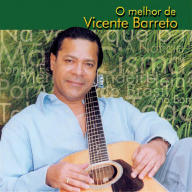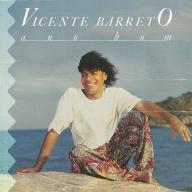Vicente Barreto's father played the violão in his leisure time, but, fearing for the future of his son, prohibited him from learning the instrument. Nevertheless, Barreto began his self-taught violão studies, hidden from his father. At ten he played for his father the challenging choro Magoado (Dilermando Reis). The old man, with tears in his eyes, granted the talented boy permission to continue his studies. Living in small Bahian upstate villages of Salgadalha and later Serrinha, Barreto began to compose very early, but was ashamed of his songs, which he used to regard as redneck music. When he listened to Gilberto Gil's Expresso 2222, he saw that the same regional influence was taken as serious music, and decided to dedicate more effort to his compositional work. Spending a little time playing in Salvador BA, he soon moved to Rio, hired by the Philips label to record his first single in 1971, with Ça Mãe, Ça Pai, his only original with music and lyrics by himself. In 1973 he moved to São Paulo, making a precarious living out of shows at the university circuit. There he met Tom Zé and was invited to accompany him in live performances and recordings. Together with the work for Tom Zé, Barreto continued to accompany other artists in shows and sessions while recorded his solo work. In 1998 released through Dabliu Mão Direita (right hand, where he focused on his distinctive right-hand swing). In the following year, released Ano Bom (Eldorado), and his eighth album, E a Turma Chegando pra Dançar (Dabliú). ~ Alvaro Neder, Rovi
Vicente Barreto
from Bahia, Brazil
Biography
Vicente Barreto is a successful composer, recorded by Alceu Valença, Elba Ramalho, Ney Matogrosso, Tom Zé, Vânia Abreu, Vânia Bastos, and Mônica Salmaso, among others. His partnerships include renowned composers like Vinícius de Moraes, Paulo César Pinheiro, Gonzaguinha, Elton Medeiros, Celso Viáfora, and Chico César. With eight solo albums where he shows his personal touch at the violão, centered in a singular right-hand swing, he remains virtually unknown in spite of the success of his songs, like Tropicana (recorded in 1982 by co-author Alceu Valença) and Baião de Quinji (his first composition to be recorded by the Quinteto Violado), along with Poeira Nos Olhos, Tirana, Trem Bom, Vou pra Campinas, and Pelas Ruas Que Andei. Also was responsible for the basic arrangements of Estudando o Samba, Tom Zé's album, which was responsible for his discovery by David Byrne.
Top Tracks
Albums
Videos
Close













